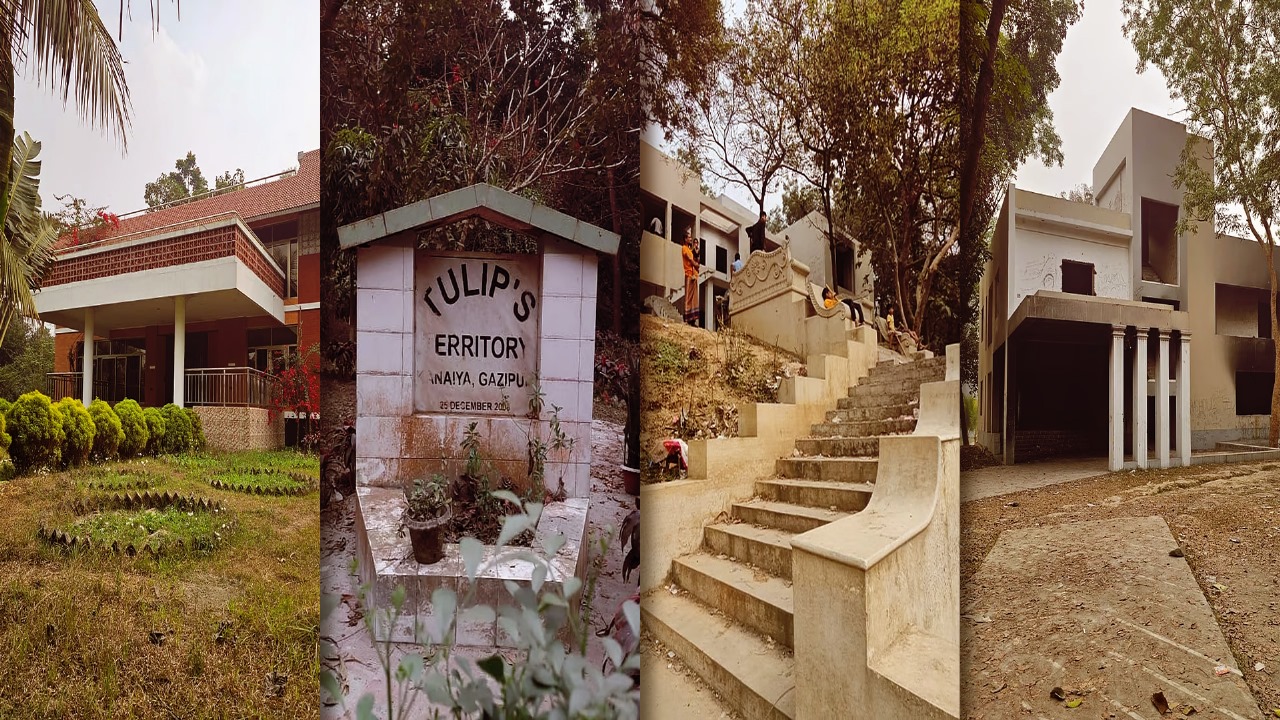August 5th helps to unearth what we always suspected: The unchecked corruption of the Hasina clan
-67a255ffcce4a.png)
Six months ago, the viral image of former dictator Sheikh Hasina fleeing Bangladesh in an army helicopter became the final, damning symbol of the 15-year reign that had plunged the country into one of its darkest eras.
The forced departure of Hasina marked the end of a regime that had ruled with ruthless autocracy, but the price of freedom was steep—more than 1,500 lives lost and over 25,000 injured in a 21-day uprising that resembled a full-scale revolution.
Hasina’s reign, propped up by three controversial, rigged elections, was a masterclass in authoritarianism. She ran a kleptocratic system, a mafia-style state in which corruption flowed like water and the lines between government and criminal enterprise were blurred beyond recognition.
Under her rule, Bangladesh became a rentier society, where state institutions were plundered by elites and ordinary citizens lived in fear.
The extent of the corruption was no secret. But the full scope of it was obscured by a culture of terror. Hasina’s regime ruthlessly suppressed dissent through extrajudicial killings, enforced disappearances, and the kind of pervasive fear that silenced even the most outspoken critics.
For years, citizens held their breath and looked the other way, knowing any opposition could end in violent retribution.
Yet, Hasina herself let slip the depths of the rot in an offhand remark. During a press conference, she casually mentioned that her own peon had amassed a staggering 400 crore taka through bribes. It was a rare moment of candor in a regime built on lies and suppression.
For over a decade, Hasina’s government had used its full arsenal—state-controlled media, judicial manipulation, and intimidation—to spin a narrative about her political rival, Begum Khaleda Zia, and her family’s involvement in corruption.
The allegations were constant, relentless, and unproven. Yet despite all the resources of the state behind them, the Hasina administration could never deliver hard evidence of Zia’s wrongdoing.
But evidence wasn’t necessary for the regime. With the judiciary acting as little more than an extension of the executive, Hasina’s political rivals were jailed on flimsy charges. Zia, in particular, was sentenced to prison in what many saw as an obvious case of political retribution.
Ironically, within months of Hasina's downfall, the very corruption she had deflected onto her opponents began to surface.
Investigations uncovered concrete proof of financial malfeasance within the Hasina family, cementing what many had long suspected: that the dynasty at the helm of Bangladesh had been soaking in corruption for years.
The truth, long buried under layers of propaganda and fear, has finally come to light, revealing the depth of the kleptocracy that governed the nation.

Tulip Siddiq scandal
Due to mounting corruption allegations, Tulip Siddiq, niece of former Bangladesh Prime Minister Sheikh Hasina and daughter of Sheikh Rehana, was forced to resign from her post as the UK’s anti-corruption minister.
Siddiq, a Labour MP for Hampstead and Highgate since 2015, found her political career in jeopardy after reports surfaced implicating her in a controversial 2013 nuclear power deal with Russia, which critics allege involved massive embezzlement.
Siddiq has denied these claims, but the controversy intensified when it was revealed that she had lived in properties in London connected to allies of her aunt.
The Sunday Times reported that Siddiq had resided in a flat in Hampstead, previously owned by a lawyer named Moin Ghani, who had represented the Hasina administration. The Financial Times also revealed she had used an apartment in King’s Cross provided by Abdul Motalif, another associate of Bangladesh’s Awami League party.
The pressure of these revelations, combined with new investigations launched by Bangladesh's Anti-Corruption Commission (ACC) into her involvement in the nuclear project, led the Keir Starmer government to demand her resignation. Siddiq complied in mid-January.
Meanwhile, the UK’s National Crime Agency (NCA) initiated its own probe into Siddiq last week, following reports of corruption tied to her role in the Rooppur nuclear power plant project in Bangladesh.
This investigation was prompted by a covert meeting between British and Bangladeshi anti-corruption officials in Dhaka last month, where Bangladeshi authorities presented new evidence potentially linking Siddiq to a significant embezzlement scheme related to the $12 billion project.
The Rooppur plant, built by Russia’s state-owned Rosatom and funded primarily through a loan from the Kremlin, has become the focal point of the investigation. Sources claim that Siddiq, along with four family members, including her mother Sheikh Rehana Siddiq, is under scrutiny for allegedly siphoning off £3.9 billion from the project’s funds.
British authorities are now reportedly examining Siddiq’s financial dealings, including her bank accounts and email records. There is also speculation that they may seek her testimony as part of their investigation.
The case centers on her involvement in the 2013 signing of the deal, where she was seen alongside Russian President Vladimir Putin.
In Bangladesh, investigations suggest Siddiq and her family diverted large sums of money from the project. The NCA has expressed its willingness to assist Bangladesh in prosecuting Siddiq under international law and is considering whether there is enough evidence to charge her under the UK’s Bribery Act of 2010.
If convicted, she could face up to 10 years in prison for accepting foreign bribes.

Hasina’s undisclosed wealth
As Tulip Siddiq faces mounting investigations in the UK, Bangladesh’s ACC has uncovered a vast, undisclosed fortune linked to the Sheikh family, hidden in luxury vacation homes on the outskirts of Dhaka, in Gazipur. Some of the wealth is reportedly held under Tulip’s name as well.
The ACC investigation revealed at least four high-end bungalows in Gazipur, one of which is curiously named “Tulip’s Territory.” These properties are registered to family members and relatives of the ousted Prime Minister Sheikh Hasina and her younger sister, Sheikh Rehana.
The bungalows are jointly owned by several members of the Sheikh family: Sheikh Hasina herself, her son Sajeeb Wazed Joy, her daughter Saima Wazed (alias Putul), as well as Sheikh Rehana, her son Radwan Mujib Siddiq (alias Bobby), and her daughter Azmina Siddique Ruponti.
In addition, Sheikh Rehana’s husband, Shafique Ahmed Siddique, owns one of the properties, while Major General (retd) Tariq Ahmed Siddique, a former defense advisor to Hasina and Rehana’s brother-in-law, holds ownership of two others.
Local residents are well aware that these luxury properties belong to the Sheikh family, with multiple investigations revealing the extent of their wealth.
In a report, Prothom Alo, Bangladesh’s largest daily, obtained official documents from the local land office that confirm the properties sit on a total of 816 decimals, or 25 bighas of land. However, locals argue that the actual land size is likely four times larger than what the documents indicate.
According to local land price estimates, the 25 bighas would be valued at roughly 49 crore taka. However, market experts believe the properties' current worth could be closer to 100 crore taka, given the rising prices of land in the area.
Notably, an affidavit Sheikh Hasina submitted to the Election Commission ahead of the 12th parliamentary elections in January 2024, widely dubbed the “dummy election,” listed her ownership of 15 bighas of agricultural land in locations such as Tungipara, Gopalganj, Gazipur, and Rangpur. Yet, she did not disclose any information about owning a luxury bungalow in Gazipur, an apparent omission that raises further suspicions.
Prothom Alo’s investigation has also traced the history of one of the bungalows to a land transaction in Joydebpur, where the Sheikh family built one of their properties.
Akshay Kumar Biswas, the former owner of the land, confirmed to Prothom Alo on January 30 that his family had once owned the plot. In 2015, Tariq Ahmed Siddique, Sheikh Rehana’s husband’s brother and Hasina’s former defense advisor, purchased the land.
However, Biswas revealed that while Siddique paid for just 14 of the 23 bighas of land, he never compensated Biswas for the remaining portion.
This discovery only deepens suspicions about the Sheikh family's wealth and raises questions about the opacity surrounding their financial dealings.
—

